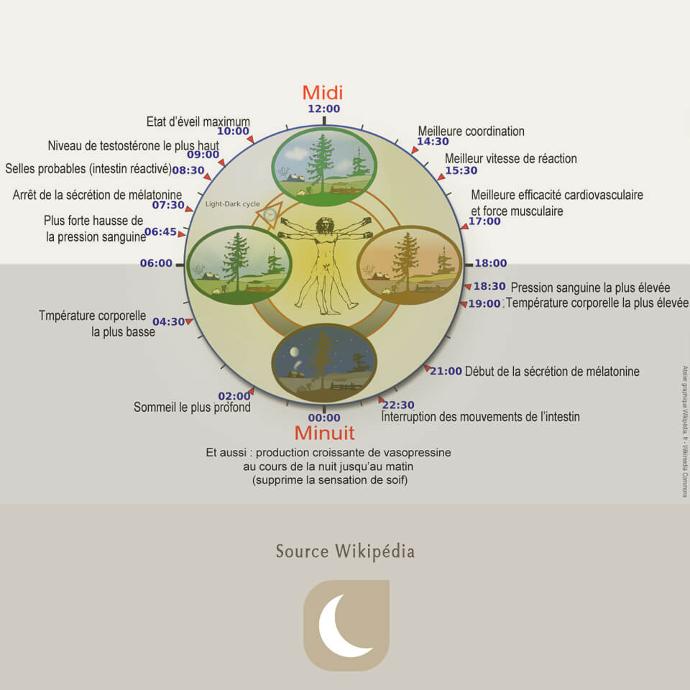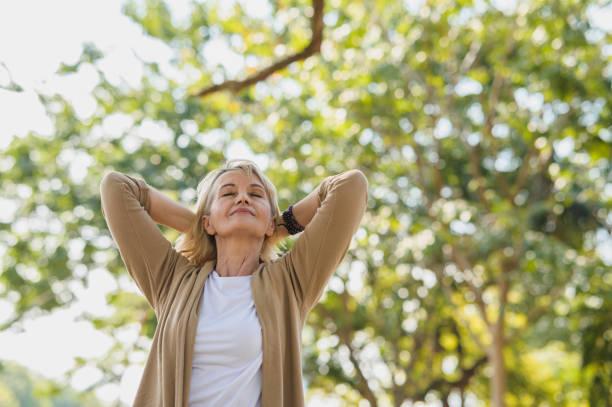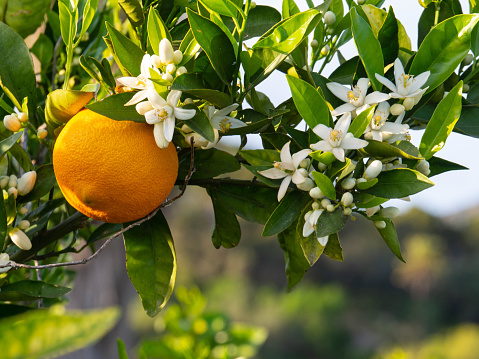Sleep is a vital need for all living beings, and many factors can affect its quality.
Sleep deprivation can have varying degrees of impact on daily life, and can even have an impact on long-term health.
We give you all the advice you need to get back to healthy, quality sleep.
What is our biological clock called?
The circadian cycle
The circadian cycle, or circadian system, is the master of our biological clock and lasts around 24 hours.
Our eyes are home to the retinal receptors responsible for regulating our circadian cycle.
In fact, by capturing natural light, the photosensitive cells of the retina regulate a small area of our brain nestled in the hypothalamus.
It is the latter that is responsible for the production of hormones involved in the regulation of certain major functions, such as sleep, energy, thermoregulation, hunger and thirst.

Melatonin, the sleep hormone:
Under the influence of the hypothalamus, melatonin is synthesized by the pineal gland in response to darkness. Melatonin prepares the body for sleep and plays an important role in our circadian rhythm.
During the day, melatonin circulates in small quantities in the blood. As the intensity of natural light diminishes, blood melatonin levels increase, peaking between two and four in the morning.
Serotonin, the happiness hormone:
Serotonin also needs light to fulfill its role properly.
This neurotransmitter is involved in circadian cycle regulation, hemostasis, digestion and mood management.
Serotonin is also the precursor of melatonin. Blood levels of serotonin fall when blood levels of melanin rise, and vice versa.
What impact does lack of light have on our sleep?
We might think that since melatonin levels become elevated with the lack of light, we sleep better in autumn or winter, when the days are shorter and greyer.
But this is not the case. Lack of serotonin leads to stress and low morale, which can have a negative impact on sleep.
And since melatonin levels are also high during the day, we feel more tired and become more sedentary.
We therefore tend to reduce or stop our sporting and outdoor activities, losing the benefits of good physical fatigue, as well as the mental well-being these activities provide.
Sleeping well is all about eating well
The quality of our diet, as well as the composition and rhythm of our meals, will influence our sleep. Certain nutrients act directly on the synthesis of certain neurotransmitters, such as melatonin, serotonin, dopamine and endorphins.
- Tryptophan is an amino acid involved in the synthesis of serotonin. It is found in eggs, bananas, meat and poultry, fish, nuts, almonds, dates, pineapple, lettuce, brown rice, milk and brewer's yeast.
- Magnesium and vitamin B6 are also combined with tryptophan, which can't do the job on its own. Magnesium is found mainly in seafood, cocoa, almonds, etc. Vitamin B6 is naturally present in potatoes, fresh green vegetables, fruit (except citrus fruit), poultry, lentils, etc.
- Omega 3s also have a role to play in brain function, notably by increasing the sensitivity of neurotransmitter receptors. They are mainly found in fatty fish (salmon, mackerel, sardines, tuna, etc.), seafood (mussels, scallops, oysters, etc.), etc.
- To facilitate digestion and improve the quality of your diet, avoid processed foods.
- Excitants such as coffee, tea and chocolate should also be limited, especially at the end of the day.
- In terms of meal composition, avoid certain food combinations, particularly proteins and starches, or eat fruit with your meal, toavoid fermentation.
- The evening meal should be lighter, but it's no good going to bed on an empty stomach either! An excessively large meal that is difficult to digest can disrupt the sleepBut an empty stomach can lead to night-time awakenings.
Make the most of natural light, even in autumn and winter
Even if the days are getting shorter and the weather greyer, getting out for a walk during the day will be good for your morale and your sleep. As soon as the weather permits, get out and enjoy a few rays of sunshine. This will also help maintain your vitamin D levels! Of course, make the most of natural light in spring and summer!
Did you know?
At home or in a specialized center, if you can't get enough sunlight and feel down in the dumps, treat yourself to light therapy sessions! Its spectrum of light, close to that of the sun, can compensate for the lack of natural light, alongside daily exposure to the sun.
How can you learn to manage everyday stress?
Stress is one of the great enemies of sleep, and it's important to be able to get rid of it:
- A good diet is a good basis for strengthening the body in the face of stress.
You can also set aside quiet times during the day, even at work:
- Do some breathing exercises, stretch, enjoy the silence, visualize calm, pleasant images or put on some soothing background music.
At home, you can enjoy a hot bath or a quiet moment in the garden:
- Remember to open the windows, get some fresh air and breathe deeply.

Why is sport an ideal ally for quality sleep?
Physical activity helps to relieve stress, make you feel better in mind and body, and generate good fatigue.
It's not necessary to make intensive efforts before going to bed.
Simply take a walk, run, cycle or swim in the late afternoon, ideally before 5 p.m.
Outdoor sports allow you to breathe deeply and get plenty of natural light to regulate your biological clock.
How to create an environment conducive to falling asleep?
The bedroom should be a calm, comfortable space that invites sleep. Ideally, the temperature should not exceed 19°C.
Avoid having television, telephone or Internet in the bedroom, which can interfere with the electromagnetic field.
We recommend moderating the use of digital devices throughout the day, and more so at the end of the day, to avoid disturbing the process of falling asleep.
The blue light generated by digital devices limits melatonin production.
How can you learn to listen to your body and follow your sleep rhythm?
If your eyelids feel heavy and your eyes sting, it's time to close them and go to bed. These signs only appear every 90 minutes or so.
If you don't listen to these signals, you run the risk of having a hard time falling asleep and getting poor quality sleep.
You can be a morning person or an evening person, just follow your own rhythm.
Go to sleep when you need to and when your body wants you to.
What's the ideal sleeping position?
There's one ideal sleeping position, and that's on your right side, for a number of reasons.
This position frees the heart, warms the liver and encourages gastric emptying. It can therefore help you fall asleep.
However, if this position doesn't suit you, the best position is the one you're used to and feel most comfortable in!

What additional tips are there to help you sleep better?
Use all the relaxation techniques that can help you fall asleep.
Make the most of massages, foot reflexology, energy practices and meditation.
A hot water bottle is your best friend during the cold season. It's harder to fall asleep with cold feet.
The hot-water bottle will warm them up, as well as helping the brain to free itself of negative ideas. Placed on the liver, it will facilitate its nocturnal work.
What plants can help you get a good night's sleep?
- Lemon balm (Melissa officinalis) Lemon balm is an aromatic plant known to contribute to calm, effective rest. It will help you fall asleep and maintain a healthy sleep. It acts directly on irritability, tension and restlessness. It helps to maintain a positive mood, promote relaxation and achieve mental and physical well-being. At the same time, it promotes digestion, circulation and hormonal balance. The perfect ally for a good night's sleep!
- Le Pavot de Californie ou Eschscholzia (Eschscholtzia californica) This plant, native to North America, is known to help manage stress and promote relaxation. It improves the quality of natural sleep and is good for morale. Its properties are used in adults and children alike.
- La Valériane (Valeriana officinalis) Valerian is a plant widely known for helping to combat stress and promote sleep. It helps you fall asleep, maintain a good natural sleep, promote calm in cases of irritability and stress, and achieve optimal relaxation. At the same time, it aids digestion, boosts circulation, improves heart function and normalizes blood pressure.
- Le Tilleul (Tilia) Lime blossom is renowned for its calming properties, ideal at the end of the day to help you fall asleep. Enjoy all its benefits in a comforting infusion.
- L'Aubépine (Crataegus laevigata) This thorny bush has remarkable virtues for restoring quality sleep and promoting cardiac function. It is used to relieve restlessness, irritability and tension.
- The Camomile (Matricaria recutita) Chamomile is THE plant for relaxation and soothing. It promotes mental and physical well-being, and helps maintain a good night's sleep. At the same time, it helps with transit disorders and soothes respiratory problems.
- The Passionflower (Passiflora incarnata) : Often associated with the virtues of Valerian, Passionflower's properties for sleep and stress have been used for centuries. In fact, it helps induce calm rest and sleep, as well as promoting optimal relaxation.
- La Marjolaine (Origanum majorana) Marjoram is an aromatic plant with relaxing properties that help preserve the quality of sleep. At the same time, it facilitates digestive comfort, supports liver functions and contributes to the proper functioning of the nervous system.
- Poppy (Papaver rhoeas) The Poppy is a plant found throughout the world. Its bright red petals give it its calming, relaxing properties. It is used for better sleep, as well as to help reduce restlessness, irritability and tension. It is used in adults and children.
- La Verveine (Verbena officinalis) Verbena is a very common meadow and wayside plant. It is known for its calming and relaxing properties.

Essential oils of:
- Lavender,
- Neroli (Orange Blossom) or
- de Mandarine rougeThey are ideal for diffusing to create a relaxing atmosphere and achieve optimum relaxation.



